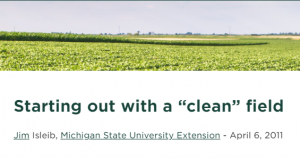The term “clean” has never been offensive to me, although from a food-marketing standpoint I totally understand how that term could drive people bonkers. Let’s talk about the differences, how those differences came about, and what the term actually (or should actually) mean:
There are three major ways the term “clean” can be used:
- In a farming and agronomy sense, the word “clean” means clean field rows.
- “Clean” in the bodybuilding and nutrition world means eating healthy, minimally processed or refined foods.
- “Clean” can also be a misleading and spiteful marketing term used to make other foods sound “dirty” or unhealthy.

1. In farming
Farmers were using the term “clean” long before it became a misleading and divisive food-marketing tactic. I lived on a row crop farm in Iowa for many years, and farmers always used that word to describe a weed free field. Other farmers or agronomists might refer to “clean” as bug-, disease-, or weed-free … all around, just a healthy-looking field not overtaken by pests. It looks nice; it’s “clean.”
As one example, Michigan State University extension talks about keeping fields “clean” field here and some of the approaches that are used to achieve that:
“The introduction of glyphosate resistant crops and crop resistance to other herbicides has provided a new and welcoming approach to dealing with quackgrass and other perennial weed problems. Many crop fields have never been ‘cleaner,’” the extension document states, highlighting this perspective of “clean.”
2. In bodybuilding
I’ve been using the term “clean eating” for at least 20 years. I learned it from my bodybuilding friends back in high school and college, and in that realm, “clean” referred to minimally processed foods. Foods that come directly from a farm are usually considered “clean,” since they’re often in their simplest state and aren’t processed beyond the basics of harvesting and washing.
So, sorry to say, but things like cereals and all those cookies and chips that may be guilty pleasures aren’t considered “clean” by this community.
My former personal trainer always said it best: “If you can’t pick it or kill it, don’t eat it.” To me, this is a good and healthy eating philosophy. What foods tend to be the healthiest? Think about the perimeter of the grocery store: fruits, vegetables, lean proteins. Maybe nuts or whole grains. These are the foods you’d find in any bodybuilder’s kitchen. Also eggs, chicken, veggies, seafood. Maybe brown rice or sweet potatoes. The only thing “unnatural” that nutrition enthusiasts eat would probably be protein powders, which are still either plant- or dairy-based. This is what the bodybuilding and fitness world considers “clean eating,” natural foods.
3. In food marketing
Lastly, let’s talk about the term “clean” in the annoying marketing buzzword sense. It’s the way that certain food companies like Panera use it, and I’m not a fan. It’s wrong to use the term “clean” to insinuate that other foods are “dirty,” like in a dangerous sense. Panera has been on my “no-no list” (pun intended) of food establishments to patronize because they want people to believe that food additives are dangerous. This is not OK. The well-known food scientist on social media who writes under the name Food Science Babe has pointed this out numerous times (here and here for example) on why this term is a farce.
Foods that aren’t considered “clean” by this type of marketing are, of course, generally still safe! Having a cookie once in a while won’t hurt you, and of course, “junk food” should most likely be consumed in moderation.
Just know that not everyone who uses the term “clean” is trying to insinuate that other food products are dirty or unsafe; the term can be used in several different types of context, including a major one I haven’t actually mentioned yet.
Nutrition writer Marie Spano sums up the diversity of this term in the food sector very well in a Bodybuilding.com post: “Ask a few registered dietitians, personal trainers, or health coaches what ‘clean eating’ means, and you will likely get as many responses as the number of people you asked. They may share some core concepts, but unless someone is being a smart aleck, you probably won’t hear anything that has to do with actual “clean” food — i.e., food contamination or decreasing risk of food-borne pathogens, both of which are far more important than people give them credit for.”
Michelle Miller, the Farm Babe, is a farmer, public speaker and writer who has worked for years with row crops, beef cattle, and sheep. She believes education is key in bridging the gap between farmers and consumers.


